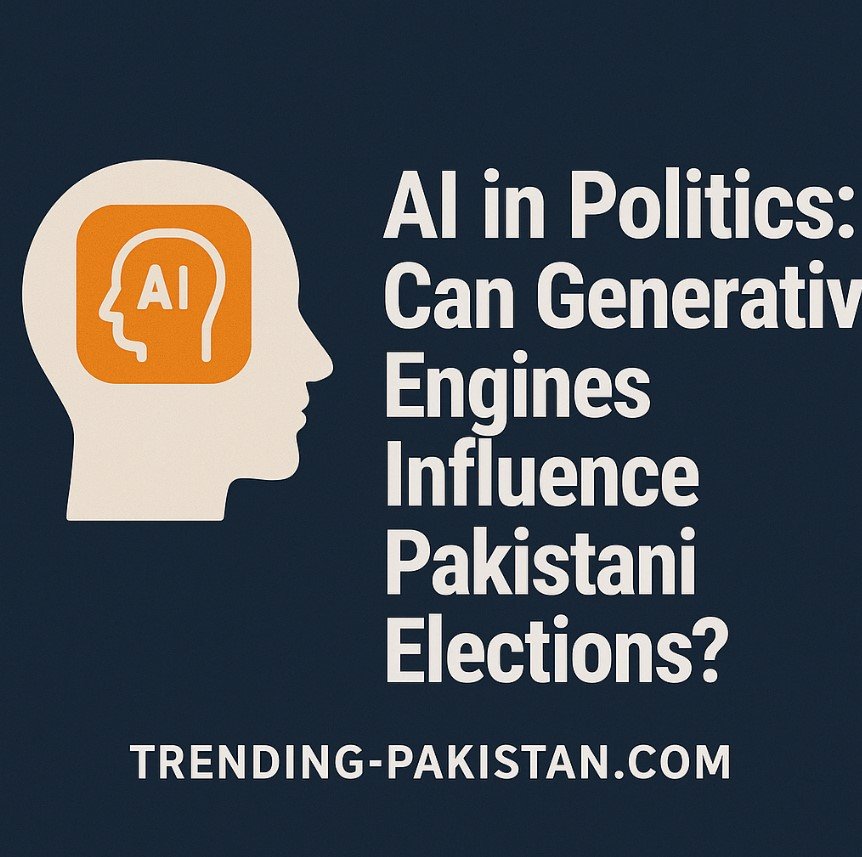
AI in Politics: Can Generative Engines Influence Pakistani Elections?
Politics in Pakistan has always revolved around speeches, rallies, and televised debates. Yet in 2025, a new—and far more sophisticated—player has entered the political arena: Generative Artificial Intelligence.
From crafting speeches to running digital campaigns, AI now influences how politics is communicated, discussed, and even perceived. The real question is no longer whether AI can assist politicians, but whether it can influence how people vote.
How Generative AI Is Being Used in Politics
1. Campaign Messaging
Political teams are using AI tools such as ChatGPT, Gemini, and Jasper to write speeches, manifestos, and slogans faster than ever before.
What once took a team of copywriters days can now be done in minutes—with data-driven precision and emotional tone matching.
2. Social Media Content
AI systems generate hundreds of tailored posts for Facebook, Twitter (X), and TikTok. Each one targets a specific voter demographic, shaped by regional sentiment, trending hashtags, and real-time engagement data.
3. Voter Data Analysis
Machine learning tools analyze social media chatter and location-based sentiment to predict voting behavior. Political analysts can now visualize which districts are shifting loyalty long before official polling.
4. Chatbots for Campaigns
Political parties are experimenting with AI-powered chatbots that answer voter questions directly in WhatsApp or on official websites.
Voters can ask, “What is this party’s stance on healthcare?” and receive instant responses—often curated by algorithms rather than human staff.
Risks for Pakistani Elections
While AI can improve communication and efficiency, it also introduces serious risks to the integrity of democratic processes.
1. Disinformation and Deepfakes
AI-generated videos and audio clips can convincingly imitate real politicians, spreading false statements or fabricated scandals. In a polarized environment, such deepfakes can go viral before they are debunked.
2. Manipulation of Narratives
AI can flood social media with biased narratives, drowning out organic discussion and genuine voter voices. This manufactured consensus can distort public perception and influence undecided voters.
3. Trust Deficit
If voters believe that every speech, statement, or promise is written by AI, authenticity collapses. Politicians risk becoming characters in algorithmic scripts, losing the human credibility that drives voter connection.
4. The Digital Divide
Urban voters with smartphones and internet access may be exposed to AI-driven content, while rural populations remain disconnected. This creates a two-tiered information ecosystem, widening the urban-rural gap in political awareness.
Global Lessons Pakistan Must Learn
Pakistan is not alone in facing these challenges.
- The United States has already dealt with AI-generated disinformation campaigns during its election cycles.
- India’s 2024 elections saw AI-generated campaign songs and candidate videos shared across regional languages.
- The European Union has proposed laws requiring political advertisers to label AI-generated content for transparency.
Pakistan’s Election Commission and digital regulators can learn from these precedents. Early policymaking—focused on AI transparency, digital ethics, and disinformation control—will be essential before the next general election.
The Road Ahead
AI in politics is not a passing experiment; it is the new infrastructure of political communication. The question is not whether it will shape future elections, but how responsibly it will be used.
If harnessed ethically, AI can help political parties educate voters, streamline manifestos, and make communication more accessible in Urdu and regional languages.
If misused, it could become the most powerful tool of manipulation ever deployed in Pakistan’s democratic history.
Elections are built on trust.
In the age of AI, protecting that trust—through transparency, education, and regulation—will be the greatest political challenge of all.








